So you’re narrowing down different countries to retire or move to. Or maybe you’re already sure that Costa Rica will be your new home. Beautiful beaches, wildlife, rolling mountains, and a more relaxed pace of life have captured your heart and your imagination. While some people move to Costa Rica without even a single visit, we recommend doing some homework before you come for good. A well planned research trip can give you a glimpse of what life will really be like here day to day. It might even save you from packing up and leaving in a year or two like many do. In this post, we’ll cover some things to consider when planning your research trip.
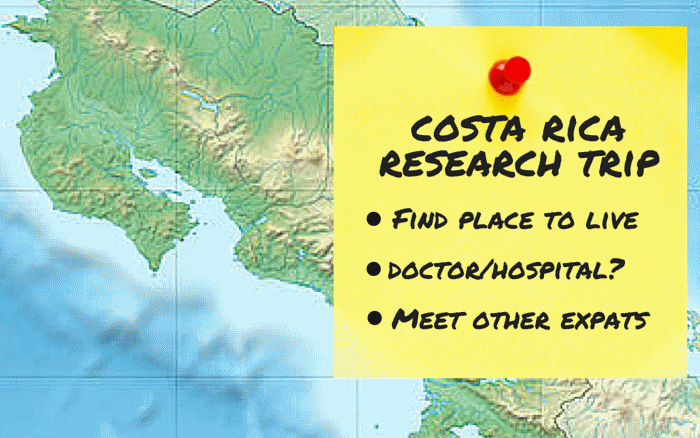
I’m moving to Costa Rica, I love it there!
People contact us all the time, saying that they had an amazing first vacation to Costa Rica. They went zip-lining, saw a sloth, wrote their name in the sand, and are already making plans to move here and buy property. Yikes! Like us, they caught Costa Rica’s most contagious disease, pura vida, and it’s serious. We always try to respond with encouragement but caution, especially if they are making huge financial decisions based on a single visit.
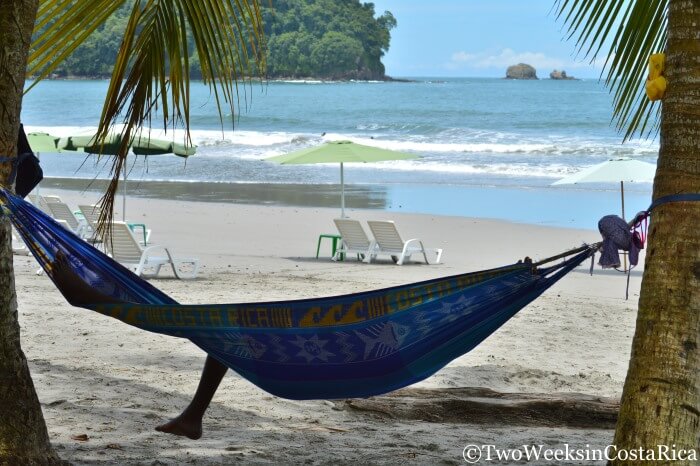
The thing about a vacation is that it is a moment in time. Everything might have been perfect during your trip, but vacationing somewhere and living there are two completely different things. Before you start lining up immigration lawyers and making real estate appointments, we suggest at least one more visit to ensure that you know what life will really be like in paradise. While this trip should be treated much differently than a vacation, it doesn’t mean that you can’t still have an awesome time.
Tip: Another useful way to learn more about what life is like in Costa Rica is to read accounts from other expats in blogs and books. For a list of our favorite Costa Rica expat books, check out our post Books to Inspire Your Move to Costa Rica.
Choosing Destinations
Unlike vacation where you choose destinations based on nearby attractions, a research trip will be more practical. You should be thinking about things like: Where are the nearest hospitals, private or public schools, shopping centers, and airports? Where will you fill prescriptions, go to the doctor, buy groceries, go to the hardware store? How are the roads? What is the Internet like? Do the towns have an adequate water supply year-round? What is the crime like in each area? What is the going rate for a rental that meets your needs? How much do groceries cost and electricity? Some of these things you might not learn about until you spend time in each town and talk to people who live there. And that’s a big reason a trip like this is so helpful.
You’ll also need to consider where you will be comfortable. Spending a week at the beach drinking cold beers in the 90 degree heat is a lot different than dealing with those kind of conditions on a daily basis. Unless of course you plan to drink cold beers at the beach every day—which some people do. The coastal areas of Costa Rica are generally a lot more hot and humid than the mountain towns and cities of the Central Valley. Guanacaste can be extremely hot and dry for several months of the year (think: air conditioning costs), while the Caribbean Coast can be really wet (think: needing a dry room). Some towns in the mountains experience high winds part of the year. Others, at higher altitudes, even get chilly at night or during the rainy season. Rainfall is another big factor. Some areas of Costa Rica get up to 12 feet of rain each year! For a general sense of rainfall in different areas of the country, read our weather post.
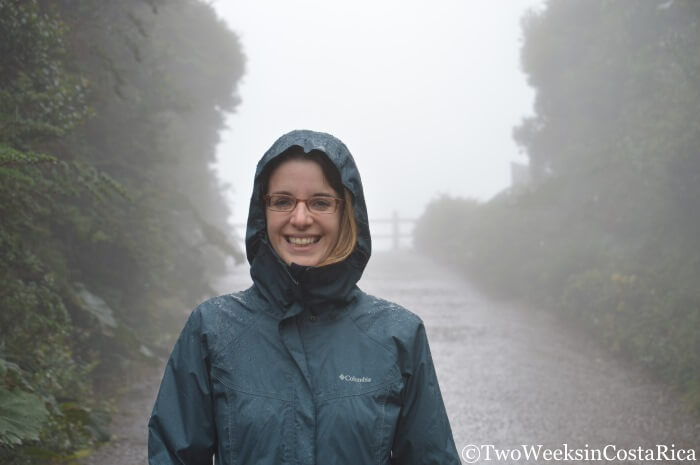
Once you’ve narrowed down your destinations, be realistic about how many you can fit into your itinerary. Make sure you’ve done a lot of research so that you can cut your list down to two or three of your top choices. Then spend as much time in each place as possible. The longer you stay, the more you will learn about a town. A second trip might be necessary if the first one didn’t bring you to your ideal place or answer all your questions, but it’s worth it not to make a move to the wrong place.
Accommodations
Once you’ve narrowed down your destinations, it’s time to start booking places to stay. There are a couple of different ways to go about this. Instead of hotels, we recommend either a vacation rental home or a small expat-owned bed and breakfast.
Vacation Rentals: Costa Rica has a ton of these, partly because a lot of people only spend a portion of the year here and want to recoup some of the money they invested in their property. (Hint: Think about this before rushing to invest in your own Costa Rican property). These houses are great because they are set up to live in like a normal house, and you cook, clean, etc., like you would on a daily basis living here. If you’re “lucky,” you’ll even have to deal with some of the perils that come with living in the tropics. Weird bugs invading the house, strange plumbing problems, surges in electricity or maybe even outages, and Internet reliability, just to name a few. These lessons can really help you know what to look for in a future rental.
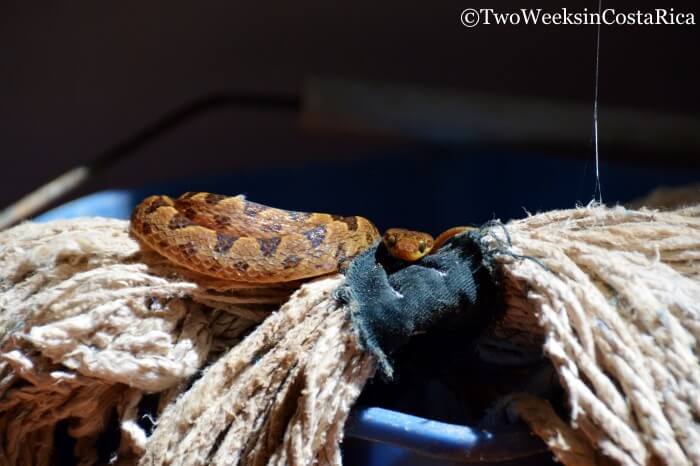
Bed and Breakfasts: Another great option is a small expat-owned B&B. We’ve always found the owners of these places to be a wealth of knowledge. Some have recently gone through the process of moving to Costa Rica themselves, while others have lived here for decades. Either way, they have a lot of useful insight to offer and are usually more than willing to chat over breakfast or sit down with you to answer some questions. When we first moved to Costa Rica in 2013, we rented for a week at a small bed and breakfast in Manuel Antonio. We learned all sorts of useful knowledge about buying a car, how cell phone plans work, where to buy things, and we even lined up a short term rental through the owner’s friend.
Dig Deep Into the Community
Once you’re actually here on your Costa Rica research trip, it’s important to get a sense of the community that you will be potentially living in. Schedule time to go to local events like the feria (farmers market), fundraisers that might be going on, and church services if you are religious. Talk to people and ask questions about where they live, how long they have been around, and so on. Conversations like this can get you all kinds of useful info and even some community dirt.
Many towns also have known expat hangouts, which could be a particular bar on a certain night, a coffee shop, etc. Ask around to see when these get-togethers are and go to as many as you can. While some people don’t want to solely associate with other expats when they move to Costa Rica, these people know the most about what it’s like to transition into another culture and are a good resource to have on hand.
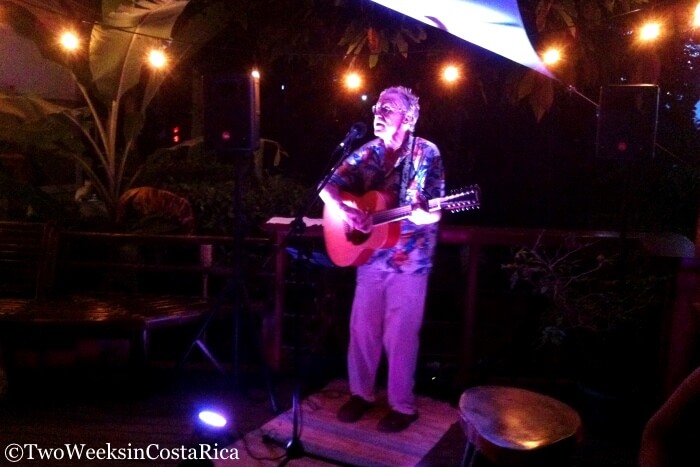
Another way to scope out a community is using Facebook. Most of the popular expat towns have a corresponding Facebook group. These are a good way to find out about local events and see what kinds of issues are going on in the community. Things like crime, water shortages, proposed improvements, and other potential issues to know about. There are sometimes even Yard Sale or Classifieds groups for certain towns, which might give you a lead on a rental home, car, furniture, or other necessities when the time comes to move.
Since you’ll be potentially living in the town you’re visiting, you should also try to get a sense of what is available locally. Browse as many of the nearby shops to see what items are available and what you can expect for prices. Even if you don’t need anything, you can still look through the hardware store, appliance center, butcher shop, different grocery stores, veterinary office, etc.
Tip: Read our post Packing for Your Move to Costa Rica to get a sense of what items are hard to find or expensive here.
If you are concerned about medical care, private hospitals will often give short tours of their facility. You could also poke your head into the town’s local clinic or public hospital to see what it is like and visit some of the pharmacies to see what they offer and how much your medications will cost if you had to pay out of pocket.
We’ve also heard from a lot of people who are planning to move their entire family down. If you’ll be enrolling your kids in school, these research trips are an important time to tour the different schools and talk with other parents.
We hope that these tips will help you plan a thorough research trip to Costa Rica. While our personal research trip wasn’t as planned out as we explained above, we would have benefitted hugely from one that was. There is certainly a lot to think about before a big move, especially to a different country. But once you are here and settling in, the feeling is like no other.
Did you do a research trip before moving to Costa Rica? What other tips do you have? Leave us a comment below (email subscribers click here to post your comment online).
More Info to Help Plan Your Move:
- FAQs About Moving to Costa Rica: Covers the basics on applying for residency, cost of living, working as a foreigner, and lots more.
- Moving to Costa Rica Checklist: Get organized for your move with this simple checklist.
- Buying a Car in Costa Rica: What to expect when buying your first car in Costa Rica.
- Where We’ve Lived in Costa Rica: Breakdown of the advantages and disadvantages of the seven different towns we lived in during our first year in Costa Rica.

